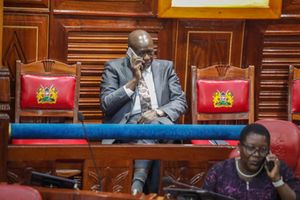
Protesters during the Finance Bill 2024 demonstrations along Cardinal Otunga Street, Nairobi on June 20, 2024.
“We are tired!”
“We are told education is key to success only to realise that connections to who you know is the key!”
These are some of the voices one could hear from the shouting Gen Z crowds revolting and protesting in recent weeks.
While the Finance Bill 2024 was the immediate trigger, the slogans show the root cause of the revolt was not the Finance Bill. They point at a governance system that does not work for Gen Z and for all Kenyans. In their social media platforms, young Kenyans emphasise that they are disadvantaged by a governance system that privileges the political elites, and their children. They want a system that works for all irrespective of tribe, region, religion or status in society.
The Gen Zs are upset by the behaviour of political elites too: paid by taxpayers but showing no respect for the people. They observe that some political elites are abusing their public offices and are ‘plundering’ taxes and then vomiting on their shoes.
But these issues are not new except that past generations did little to address them. In fact, there has been a competition to become a political elite if the number of people seeking elective offices is anything to go by. The post-2007 election violence was itself caused by resistance against this form of governance.
Public resources
The 2010 Constitution was made to address these challenges. The Constitution provides for prudent use of public resources. It provides for devolution of power and resources to ensure no part of Kenya is marginalised on account of political consideration. Chapter Six on leadership and integrity requires public officers to respect people, bring honour to the nation and bring dignity to the office they hold.
But the Constitution has not been effectively implemented and the old order has triumphed. Therefore, Gen Zs are worried about lack of change. They worry about political elites plundering public resources with impunity and without consequences.
For a long-time, ethnic-based politics has been the fulcrum around which political competition revolves. But ethnic-based politics lacks mechanisms for accountability. Ethnic elites do not account to their communities. They mobilise votes but disappear immediately. They use communities to gain power.
This continues to undermine implementation of the 2010 Constitution. Indeed, immediately the Constitution was passed, elites from President Mwai Kibaki’s Mount Kenya region began to weaken its implementation. The Courts had to intervene.
But it was the 2013 election outcome that completely weakened the implementation by creating a culture for impunity and poor accountability. Chapter Six on leadership and integrity faced multiple interpretation with regard to whether Mr Uhuru Kenyatta and his running mate, Mr William Ruto, could for office the 2013 election when they had cases at the Interna in light of the new constitution, Kenyatta and Ruto should have waited to clear their names and then run for office later in 2017 elections. The courts, however, cleared them to run for office. This opened the gate for many people with cases in court to vie for office. Some won. This laid a foundation for impunity because they would use their offices or even communities to fight off the cases.
Gen Z protests have brought back demands for accountability. They want an end to a culture that promotes the interests of a few elites at the expense of many in the society. They want leadership that is accountable and leadership that brings honour and dignity to the society. They are concerned that elites are using taxes to finance opulence and to show off luxuries when many people are finding it hard to go by.
Hustler-dynasty
The Gen Z are taking cue from the 2022 presidential election campaigns. It is President William Ruto himself who campaigned on the “hustler-dynasty” narrative. He argued that the system of governance prevailing favoured only a few, the dynasty. He mobilised support to build a system that works for all irrespective of tribe or status in the society. This then is the language the Gen Z are articulating. They want a system that works for everybody. They are demanding that the President acts on arrogant politicians around him; they want the corrupt sacked; they want an end to opulence using taxpayers’ money.
The voice of Gen Z is resonating with many people. Indeed, the President acknowledges the need act and improve governance to ensure the systems work for all citizens. Overall, no matter what action is taken, the tribeless Gen Z have moved public demands for accountability and for a better Kenya higher than ever before.
Politicians have been forced to show respect to people. Those who used to drive with sirens and chase cars on the opposite direction in traffic, are now following traffic rules. County governors have also disappeared from the roads. There are no sirens on the road except for ambulances. Politicians have quickly learnt to keep order. They are not showing off their power and wealth. They have even withdrawn from the showing off in churches where pastors encourage them to give money. Gen Z have certainly helped Kenya to build order where it did not exist. How much this will last depend on actions taken in response to Gen-Z demands to build a system that works and delivers for all.
Prof Kanyinga is based at the Institute for Development Studies, University of Nairobi. This is an abridged version of his keynote presentation at an Editors’ Roundtable by the Eastern Africa Editors Society on the youth question [email protected]; on X @karutikk










